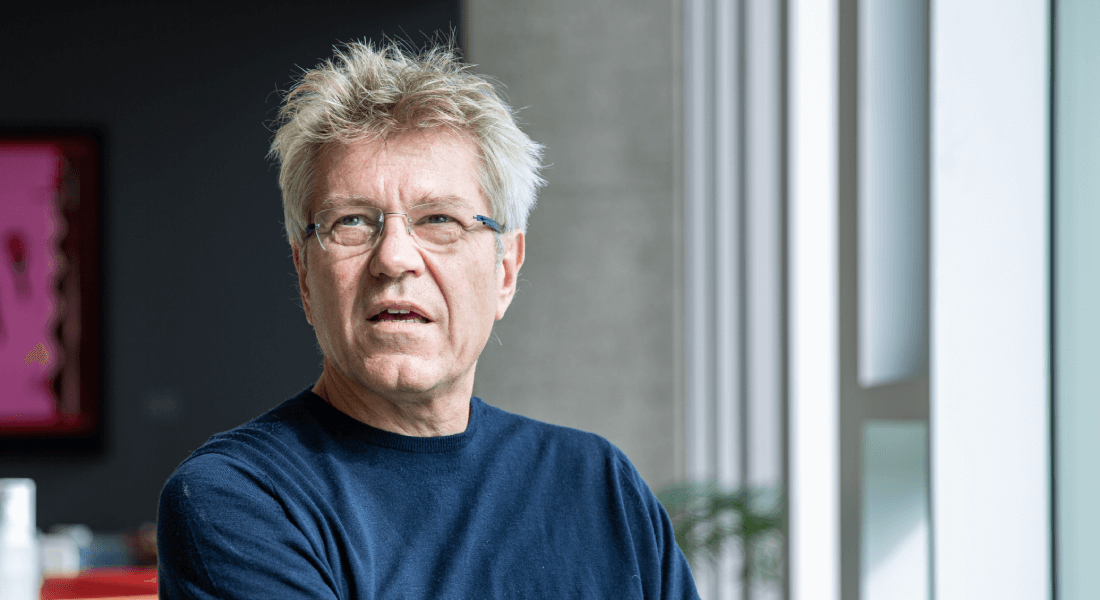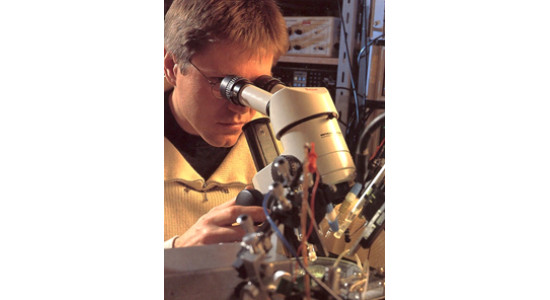Brain researcher honoured for mapping neural circuits that control movement
Professor Ole Kiehn from the University of Copenhagen receives the preclinical KFJ Award for his ground-breaking neuroscientific research. He has mapped the neural circuits that activate and control movement.

This year’s prestigious KFJ Award goes to two researchers from the Faculty of Health and Medical Sciences. It is awarded annually by the Kirsten and Freddy Johansen Foundation for excellence in the medical sciences, among other fields.
The pre-clinical award goes to Professor Ole Kiehn, who is Head of Group at the Department of Neuroscience, while the clinical award goes to Professor and Consultant Doctor Anders Perner. Both recipients receive DKK 1.5 million of which DKK 250,000 constitute a personal prize.
‘I am very happy to receive the award. It means a lot to me personally, but mainly, I guess, because it celebrates the work I represent. It is a great recognition of my research field and all the amazing people who have contributed to it over the years’, says Ole Kiehn, who began his career in 1977 as a medical student at the University of Copenhagen.
Since then he has made huge contributions to the field of neuroscience. Over the last 30 years, he has systematically mapped the basic neural circuits executing muscle activity. His research has also contributed to the development of future therapies for severe neural conditions such as Parkinson’s disease, ALS and spinal cord lesions.
In 2001, he moved to Karolinska Instituttet, who appointed him Professor in 2004, and which still houses part of his laboratory. In 2017, he returned to the University of Copenhagen on a Novo Nordisk Foundation Laureate Research Grant.
Since 2008, he has been a member of the Nobel Assembly, who awards the Nobel Prize in Physiology or Medicine and serving as an adjunct member from 2011-14 years and an elected member from 2014-2019 of its Nobel Committee, which is responsible for evaluating the nominees.
From medical science to brain research
When Ole Kiehn began his research career as a medical student back in the 1980s, the present-day Department of Neuroscience, which now has a staff of just under 200, did not exist.
‘It was a small place, then called the Department of Neurophysiology. It comprised seven or eight laboratories (Editor’s note: Today, the department houses a total of 26 laboratories), and here I met the then relatively newly appointed Professor Hans Hultborn, who at the time was doing animal work on spinal motor physiology. I found this extremely interesting, and he was so full of energy, so I asked if I could join his lab, Ole Kiehn says.
In the 1980s there was no such thing as PhD students, nor was laboratory work part of the syllabus of medical students. So Ole Kiehn started doing research concurrently with his studies. Eventually, though, he decided to take a leave of absence to concentrate on his research.
‘I had developed an interest in the brain for a very personal reason: My girlfriend at the time had suffered a seizure and the cause, it turned out, was a tumour in the brain. Fortunately, she survived and is still alive and well today, but that one of the things that triggered my interest in the brain. It is an amazingly complex organ that controls all aspects of our lives’, he says.
In Hans Hultborn’s laboratory, Ole Kiehn laid the foundation of his own research, which has increased our understanding of how the brain works.
‘It was an extremely interesting project that explored the function of motor neurons. They are the ones that directly control our muscles. And we managed to describe the phenomenon plateau potential, which would completely change our perception of the function of motor neurons’, he says.

After graduating he went straight into research. A couple of years later he travelled to the US to do a postdoc, and this in many ways shaped his idea of how to create a strong, international research environment.
‘The research environment at Panum at the time not as large as now. The idea was that you had to travel abroad to be able to bring something home with you, and I think young people should continue to do that. We researchers benefit from experiencing the research environments in other laboratories, and it is important to learn how people in other parts of the world do research. This enables us to create the best possible environment at home. Even established researchers benefit from international collaborations in order to create the best possible conditions for their own research’, he says.
After completing his postdoc in the US, Ole Kiehn returned to Panum to establish his own laboratory, which is where his endeavour to understand motor functions really began.
The art of asking the right questions
Even as a leading international researcher, Ole Kiehn continues to stress the importance of his collaborations with other researchers, young as well as old. The new generation of researchers is vital to any research field, and that is why Ole Kiehn invests a lot of energy in his mentor role as supervisor of PhD students and postdocs.
’To learn how to do quality research, it is extremely important to have a mentor. You can do all kinds of experiments, but they will not all be relevant. It is about asking the right questions, and that is what I try to teach. Most people can learn to write a research article and perform other practical parts of a research process, but to do quality research you must be able to ask the right questions’, he says.
As a teacher, Ole Kiehn also seeks to prepare his students and hopefully arouse the curiosity of some to make them realise the importance of research.
New research can prevent spasticity
Most recently, Ole Kiehn and his laboratory have provided the basis for a new treatment for spasticity. Through mice experiments, he and his staff have shown that an already approved drug can help curb the development of spasticity.
Their discovery may contribute to the prevention and treatment of debilitating spasticity in patients with spinal cord lesions.
Thus, in its assessment the KFJ Award Committee stresses that Ole Kiehn’s ground-breaking discoveries not only is important for understanding how the brain control movement but facilitate a further expansion of our knowledge of the neural circuits responsible for higher brain functions.
The KFJ Awards will be presented on Friday 8 October.
Contact
Professor Ole Kiehn
ole.kiehn@sund.ku.dk
+45 93 56 59 63
